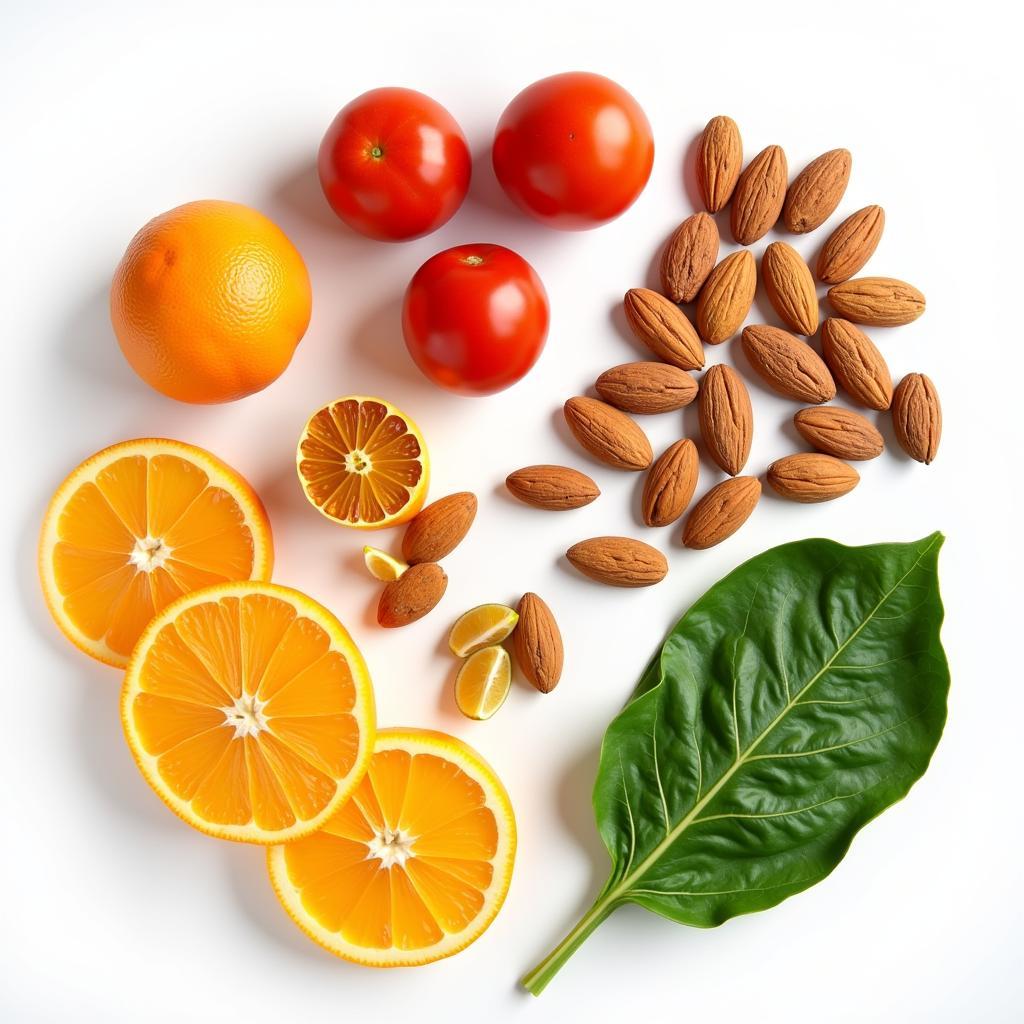Foods That Decrease Melanin have become a popular topic in recent years, with many people seeking ways to lighten their skin tone. This article delves into the science behind melanin production, explores the foods often associated with melanin reduction, and separates fact from fiction about dietary influences on skin pigmentation. We’ll also discuss lifestyle choices and other factors that can affect melanin levels.
Understanding Melanin and Its Role
Melanin is a complex pigment responsible for the color of our skin, hair, and eyes. It’s produced by specialized cells called melanocytes, which are located in the epidermis, the outermost layer of skin. Melanin acts as a natural sunscreen, protecting our skin from the harmful effects of ultraviolet (UV) radiation from the sun. The more melanin you have, the darker your skin tone.
What Influences Melanin Production?
Several factors influence melanin production, including genetics, sun exposure, hormones, and certain medical conditions. While diet plays a role in overall skin health, the direct impact of foods that decrease melanin is often exaggerated.
Debunking the Myths: Foods and Melanin Reduction
Many articles and social media posts claim certain foods can decrease melanin production and lighten skin tone. Let’s examine some common claims and the scientific evidence behind them.
Foods Rich in Antioxidants
Foods rich in antioxidants, such as berries, dark chocolate, and green tea, are often touted for their skin-brightening properties. While antioxidants can protect against free radical damage, which can contribute to hyperpigmentation (dark spots), there’s limited scientific evidence to suggest they directly reduce melanin production throughout the body. They can, however, contribute to overall skin health, leading to a more even complexion.
Foods Containing Vitamin C
Vitamin C is another popular ingredient often associated with skin lightening. While vitamin C is essential for collagen production and can help fade dark spots by inhibiting tyrosinase, an enzyme involved in melanin synthesis, it’s unlikely to significantly reduce overall melanin levels.
Foods with Specific Nutrients
Some nutrients like vitamin E, glutathione, and lycopene are also linked to skin lightening. While these nutrients can contribute to skin health and may offer some protection against sun damage, there’s little evidence to support their direct impact on reducing overall melanin production.
 Nutrient-Rich Foods for Skin Health
Nutrient-Rich Foods for Skin Health
A Holistic Approach to Skin Health
Rather than focusing solely on foods that decrease melanin, a more effective approach involves embracing a holistic view of skin health.
Protecting Your Skin from the Sun
Protecting your skin from excessive sun exposure is paramount. Use broad-spectrum sunscreen with an SPF of 30 or higher, wear protective clothing, and seek shade during peak sun hours.
Maintaining a Healthy Lifestyle
A healthy lifestyle that includes a balanced diet, regular exercise, and adequate sleep can contribute to overall skin health.
Consulting a Dermatologist
If you have concerns about hyperpigmentation or uneven skin tone, consult a dermatologist. They can recommend appropriate treatments based on your individual needs.
Foods that Support Skin Health (Not Necessarily Decrease Melanin)
Instead of focusing solely on decreasing melanin, prioritize a balanced diet that supports overall skin health. This includes:
- Fruits and vegetables: Rich in vitamins, minerals, and antioxidants.
- Lean protein: Essential for cell repair and growth.
- Healthy fats: Found in avocados, nuts, and seeds, contribute to skin hydration.
- Whole grains: Provide fiber and essential nutrients.
Conclusion
While certain foods may offer some benefits for skin health and potentially help fade dark spots, there’s no magic bullet when it comes to foods that decrease melanin significantly. Focus on protecting your skin from the sun, maintaining a healthy lifestyle, and consulting a dermatologist for personalized advice. By adopting a holistic approach, you can achieve healthier, more radiant skin.
FAQ
-
Can I completely change my skin color through diet? No, while diet can influence skin health, it’s unlikely to drastically change your natural skin tone.
-
Are there any side effects to consuming foods rich in antioxidants and vitamins? Generally, no, but excessive intake of certain vitamins can have adverse effects. Consult a doctor or nutritionist before starting any new supplement regimen.
-
How long does it take to see improvements in skin tone with dietary changes? It varies depending on individual factors, but generally, you may start noticing improvements in skin health after several weeks or months of consistent healthy habits.
-
Are there any topical treatments that can help with hyperpigmentation? Yes, consult a dermatologist for recommendations on topical treatments like hydroquinone, retinoids, or chemical peels.
-
What else can I do besides diet to improve my skin health? Adequate sleep, stress management, and regular exercise are crucial for healthy skin.
-
Can foods that decrease melanin help with conditions like melasma? While some foods may support overall skin health, they’re not a primary treatment for conditions like melasma. Consult a dermatologist for appropriate medical advice and treatment options.
-
Is it safe to try DIY skin lightening remedies? It’s best to avoid DIY skin lightening remedies, as they can be ineffective and potentially harmful. Consult a dermatologist for safe and effective treatment options.
Need More Help?
For further assistance with skin health and dietary guidance, contact us at Phone Number: 02437655121, Email: minacones@gmail.com Or visit us at 3PGH+8R9, ĐT70A, thôn Trung, Bắc Từ Liêm, Hà Nội, Việt Nam. Our customer service team is available 24/7. Check out our other articles on skin health and nutrition for more helpful tips.